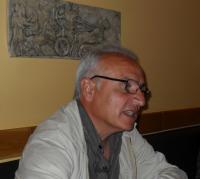The fanaticism here died down somewhat in time

Download image
Dionisios Vafiadis was born in Czechoslovakia in 1953. His parents came to the country in January 1950 from a Bulgarian refugee camp. His father was with the partisans during the civil war, and he remained an active communist afterwards. Dionisios kept to his father’s footsteps. He learnt to be a plumber, and when still a teenager he actively participated in the communist youth movement. In the early 1980s he decided to repatriate. However, after spending several years doing manual labour he left Greece and moved to Australia. After 1989 he returned to Czechoslovakia and now lives with his family in Brno.
